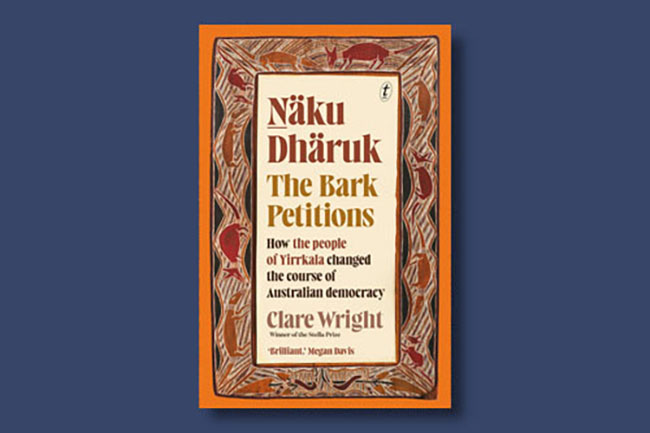Jim Kable reviews a book by Arnie and Lee Duffield, filled with yarns about the Torres Strait, its people, pearling culture and the social change that followed the collapse of the shell industry.
Arnie: Pearls And Luggers In The Torres Strait is a collaboration between Arnie Duffield – out of his many years in the Torres Strait (Thursday Island) and involvement in pearling, luggers and other boats – and his younger cousin Lee Duffield, a long-time journalist with the ABC and Independent Australia's media editor.
I have not been to the Torres Strait though it’s long been a desire. When I think of that sweep of seas and islands I see Eddie Koiki Mabo, actor/comedian Aaron Fa’aoso, the Japanese pearling presence, James Cook and Possession Island, and even Christine Anu’s 1995 version of 'My Island Home' comes to mind.
And then there’s Thomas Mayor, unionist and writer born on Larrakia Country, Darwin, proudly claiming his Torres Strait ancestry as he writes on Uluru and 'The Uluru Statement from the Heart'. Some might well think of the Torres Strait and its peoples as the star atop the nation.
One thing to note about this book is that although the chapters suggest a chronological progression – as with the yarns that the interviews by Lee Duffield with his cousin Arnie essentially are – the references go backwards and forwards. A scary plane trip, time in Brisbane, a vessel which has undergone several lives and name changes in the Torres Strait and elsewhere: characters pop up in different time frames.
Within, you will find references to singers the Mills Sisters and to their brother Sam, grandfather to powerhouse international basketballer and top human Patty Mills. Mills' Kokatha mother and Torres Strait father (born in Canberra and family-linked to Eddie Koiki Mabo) also get a mention in these pages.
The book is a social history set in the administrative centre of the Torres Strait — Thursday Island – and includes Horn Island and nearby Bamaga (at the tip of Cape York) and the pearl shell and trochus (used for buttons and jewellery) business. It traces connections to the islands' inhabitants and speaks of wartime and post-war reinvigoration, and the beginnings of social change for the local islanders, followed by the collapse of the shell industry.
It delves into other ventures like prawning and pearl culture. And informs on one of the first of the great ecological disasters in our waters — the oil spill in 1970 of the Oceanic Grandeur and subsequent clean-up, including the use of the dispersant Gamlen which ruined the pearl culture industry. (Battles for compensation during the Bjelke-Petersen years with the kinds of shifting goalposts of government legal sophistry, come to nought.)
It’s a story of the Duffield family and their move north from Brisbane to Thursday Island. Arnie's father Ernie was a principal marine engineer for a pearling company. The book deals with their early lives – Arnie 10; older brother Jim, 12 – when they arrived. Noted is the fact that Waiben Islanders (Thursday Islanders) were banned from living on their own island.
Arnie mentions a noted Japanese shell diver in the deep waters off Erub (Darnley Island) called “Tomo" and refers to Japanese ship-builder "Tachi Obana” (more likely the Japanese family name Tachibana) but further references to Japanese people – whether builders or divers or with interests in the pearl culture – are unnamed.
With the arrival of the war, all Japanese were interned (343, including 14 women and 14 children). Just before the fall of Hong Kong they were taken south and sent not to Hay, as we find on p.29, but actually to Tatura in Victoria (and some possibly to Loveday in South Australia).
Other civilians were also evacuated in a number of ships heading south. Several locals remained behind as caretakers of vacated homes and other buildings. Five years later Arnie recalls his mother visiting the house of one of the caretakers where she found a number of her own pieces of furniture. The homes of the Japanese were looted by occupying soldiers.
In the post-war era, along with the return of pre-war industries, there were social and political changes. Thursday Islanders had been responsible for the provision of local government, education and health, etcetera, during the time Europeans were evacuated. Their demands were for Australian citizenship, freedom of movement, control of wages, better pay and housing, education and jobs.
These demands were gradually implemented. And so, too, began the movement away of many of the younger ones in search of education and jobs. About three times as many islanders now live on the mainland as in the Torres Strait.
Arnie relates that the film King of the Coral Sea starring Chips Rafferty, Charles Tingwell and a young Rod Taylor was shot there in 1954. Chips comes across as an especially unpopular figure — a heated argument on the steps of the Grand Hotel he had with Arnie’s brother, Jim, egged on it would seem by cold beer!
Anybody with any interest in this top corner of Australia – the islands, the people, the old industries, vessels, luggers, cutters and ferries (most of them listed in the back by owner and name of vessel) – will find this slim volume an enjoyable read.
‘Arnie: Pearls And Luggers In The Torres Strait’ is available from Amazon for $14.08 (paperback) RRP.
This book was reviewed by an IA Book Club member. If you would like to receive free high-quality books and have your review published on IA, subscribe to Independent Australia for your complimentary IA Book Club membership.
Jim Kable is a retired teacher who taught in rural and metropolitan NSW, in Europe and later, long-term in Japan. He is also a member of the steering committee of political party The New Liberals.
 This work is licensed under a Creative Commons Attribution-NonCommercial-NoDerivs 3.0 Australia License
This work is licensed under a Creative Commons Attribution-NonCommercial-NoDerivs 3.0 Australia License
Support independent journalism Subscribe to IA.












